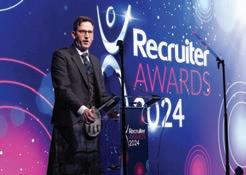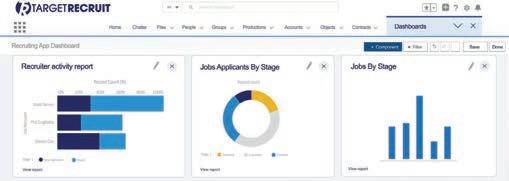Entrepreneurial DNA is alive, well and thriving in recruitment




Entrepreneurial DNA is alive, well and thriving in recruitment


















05 Recruiter Awards attendees give generously to Autistica Dr James Cusack, CEO of Autistica, thanked all the supporters who donated at the awards ceremony
06 A new digital definition of the workplace Is a digital workforce the solution to fill the mundane jobs in the workplace?
07 2O25: hope for the best, plan for the worse Recruitment has experienced a difficult 2O24, so what does 2O25 have in store?
08 Contracts & Deals
11 Business Advice Tara Ricks on building financial success
12 Workplace Organisations are failing to manage talent effectively
17 Insight
Should recruiters become trusted advisers to CHROs to help them navigate critical human capital moments in the business?
20 Tech & Tools
The latest recruitment technology and services


22 Viewpoint
Katarina Morgan, Taylor Walton Solicitors 23 Soundbites
24 THE BIG STORY: Recruitment visionaries
The Recruitment Industry Entrepreneur of the Year shortlist at the 2O24
Recruiter Awards has shown that entrepreneurship is alive and well, and thriving
31 TMC offers businesses the employeneurship approach European-headquartered
The Member Company (TMC) is potentially turning the recruitment business model on its head









We identify those uncommon people with the vision and drive to start their own company. We invest in and support our founders to build, scale and exit.

Another government budget, another failure by the government to regulate the controversial umbrella sector whilst leaving recruitment companies to clean up afterwards. From April 2026, recruiters will be responsible for ensuring the correct PAYE deductions for individuals working through intermediaries – a backward shift in this to-and-fro tug-of-war. Why can’t the actual middleman in this be held accountable? Umbrella companies are accounting companies. It’s their job and their profession to ensure the people they pay get the correct amount of money, with the right sums going to others owed.
“Be inspired and look to enter the entrepreneurship category in our 2025 Recruiter Awards”
Isn’t that what accountants and payroll professionals are supposed to do?
Entrepreneurialism is the lifeblood of recruitment, and in this end-of-year issue of Recruiter, we pay homage to this exciting breed of human. The Recruiter Awards panel that adjudicated the 2024 entrepreneurship category found the shortlisted candidates so impressive that they wanted to share the array of backgrounds and accomplishments with our audience via an article by Belinda Johnson, entrepreneur and recruitment industry leader. Be inspired and look to enter that category in our 2025 honours. And from Europe, we share insight into a uniquely non-UK entrepreneurial employment model, TMC.
Have an optimistic end of 2024!

DeeDee Doke, Editor


BY DEEDEE DOKE
ATTENDEES AT THE RECRUITER AWARDS 2024 gala raised more than £6k for the magazine’s Charity of the Year, Autistica.
“That’s fantastic,” said Dr James Cusack, the organisation’s CEO, who gave a brief presentation on Autistica’s work to the crowd at the awards event (pictured above). “I just want to say a huge ‘thank you’ for supporting us. As a charity, we’re able to catalyse innovations that have a massive impact on people’s lives. In relative terms, we’re a small charity but globally, we’re recognised for the impact that we have. So thank you for having us as your charity!”

Founded in 2004, the UK-based charity is engaged in funding and campaigning for research on autism and related conditions. Its research strategy is focused on improving the understanding of mental health, physical health, language and epilepsy in autism.
Among the research projects underway at Autistica is one built around the concept of a ‘readiness for work’ academy. This is aimed at understanding how people with autism can be helped to “develop skills they need to prepare for the workplace, being ready for work”, including experience with social interactions, Cusack told Recruiter
“It’s not just about having good exam results,” he explained.
“We have to recognise that autistic people don’t always have the same opportunities to develop those skills, [through] participating in social clubs or playing with football teams. Maybe even having a part-time job might just be quite challenging for some. We need to really recognise that’s a bit of an issue for autistic people to have that extra level of readiness for work, and also to think about how work might look for them.”
Cusack, who received his diagnosis of autism as a child, went on to say: “What we’re looking to do is engage with autistic people who are getting to the stage of late childhood, to understand how this would be best delivered to them and build confidence, to show that access to work is something that is possible for them, even if it might require certain adjustments. This is about understanding and a perspective of how we can best support them and what the best ways are to reach the most amount of people, which will have the biggest impact.”
Implemented earlier this year was an index to provide a measure of neuroinclusion for organisations. The NDEI (Neurodiversity Employers Index) will enable organisations to measure themselves against best practice, with suggestions on how they can improve, and an annual awards programme. When completed, organisations will receive a personalised report, a score, and recommendations for improvements and signpost to resources to help make those changes. All organisations will be invited to be listed in the annual market report, which will help them to attract neurodivergent talent. Both projects characterise two pillars that Autistica is built on, Cusack said: “They are around empowering autistic people but also empowering employers to understand neurodiversity.”
• To contact Autistica, visit autistica.org.uk
AS OF 30 OCTOBER 2024
BY DEEDEE DOKE
IS A DIGITAL workforce the solution to fill the mundane jobs in the workplace?
The digital approach could combat the dwindling numbers of humans in the world population, and take jobs in industries ranging from automotive to hospitality, according to a Dutch AI entrepreneur.
Mathijs Gast is the CEO of Freeday, which he describes as a digital staffing agency. Freeday can deploy three digital personas with different specialisms: customer care, finance and accounts payable, and working with payslip and passport checks at banks and insurance companies. “The best thing is, they don’t get sick, they can work 24/7 and they can speak any language,” said Gast in a talk to the Corporate Finance International HR conference in Amsterdam on 3 October. “We deploy these to our clients, basically within the same model as staffing agencies. This is quite successful right now
with large clients adopting our digital employees.”
Even staffing agencies are ‘recruiting’ Freeday’s digital employees for hybrid solutions, Gast said: “And then you might think, why would they do that? Aren’t they cannibalising their own businesses because they have the humans and they want that to work? Well, what we’re learning is that no graduates or career-starters want to be the one at the accounts payable department checking invoices and doing all that mundane, robot-like work.”
Gast said that the working agreement between his digital staffing agency and a client involves a monthly contract for the service for a fee. The results, he said, have been favourable. “The thing is, they do two, three or four times as many transactions as the customer service department, that a traditional agency does. A market area in which his digital employees have proved worthwhile is cryptocurrency. A leading cryptocurrency exchange, he said, uses the digital assistants to handle incoming chats. “Whenever Bitcoin hits a high price, they are very busy, but after a few months, we’re still doing the telephone line, so you have a really human-like conversation with AI,” he said.
In summary, he said: “My suggestion is that we broaden the definition of ‘workforce’ to include digital workers and that we all start acting on it.”
DEEDEE DOKE
WHAT WILL BE YOUR MANTRA as your business moves into a new year – ‘Drive to ’25’, ‘Thrive in ’25, ‘Revive in ’25’ or ‘Survive in ’25’?
Directors gathered for an Elite Leaders insights discussion pondered that wry question, with overall agreement that 2024 has been “a tough year” for many recruiters – and one diplomatically-expressed view at the meeting that the current year has been “challenging with pockets of light”.
Statistics suggest that recruitment has indeed seen a difficult business year or 18 months – even “brutal”, some say – with an estimated 600 recruitment businesses having left the field and the loss of 32% of the recruitment consultant workforce over the same period.
Elite managing director Sid Barnes (below, right) predicts that 2025 will get off to a slow start.
“I don’t think next year is going to be hugely exciting for the UK,” Barnes said. “I think the first half will be more of the same [as 2024], and I think we’ll see an uplift in the second half [in the UK] … a much more buoyant uplift.” He went on to suggest that recruiters in the “mid to senior level, white collar, mainly professional spaces” will see an average of 23%+ net fee income growth, year-on-year, with probably 6% of that figure emerging from “market uplift, inflation, salary increases”.
“Where’s the rest (of the 23%+) coming from?” Barnes asked.
Key to NFI growth is about capacity analysis and productivity, he said, not about increasing head count. “I’ve said
to companies, the last thing you need is more heads. It’s about capacity analysis, so I like to look at who’s not producing an average (amount of sales). How do you get those people up before you’d even contemplate bringing anyone else in?
“That’s always baffled me in the past,” Barnes continued. “It seems that head count has been about ego, and a lot of people have sailed very close to the wind because of ego and no longer exist right now. This is not about ego. It’s about productivity.”
Financial improvement also means earning more business from existing clients, Barnes emphasised. “The ideal is, you’re going to grow by 25% next year, and all of it is going to come from clients that you billed in 2024 – if you can do that,” he said, “that’s the quickest shortcut. In my opinion, the objective is to keep every customer and get them to spend more every year.
“Is that going to happen? Not all the time now, but that has to be the anticipation. It is still way easier to do repeat business than it is new. Yet, as an industry, we’re still absolutely obsessed with new business.”
Summarising, Barnes said: “We can’t do anything about the external market, so we’ve got to do as much as we can on the internal market. It’s still a £1tn business globally, and there’s 600 recruitment companies unfortunately gone bust in the last 18 months, and there’s 32% fewer recruiters than there were 18 months ago. The market’s tough… so we fight, right? We fight until the last person turns the lights off.


“The good companies focus on productivity, customer focus, marketshare, regardless of the market; so while we hope for the best, we plan for the worst.”




In this fast changing and uncertain landscape, your recruitment business doesn’t just need a legal adviser. You need a trusted partner with real industry experience and expertise
As a key legal partner to all the main recruitment sector trade bodies, and the winner of APSCo’s 2024 UK Trusted Partner of the Year award, our team has a deep understanding of your sector and acts fast to protect your interests.
What we do
We specialise in advising businesses across the sector, from traditional recruitment businesses, international recruiters, platform developers, recruitment process outsourcing businesses, managed service providers, neutral vendors and umbrella companies to head-hunters and trade bodies.
We provide expert, tailored practical support across the full range of legal services.
Here these include: Acquisitions, sales and alternative business structures including Employee Ownership Trusts.
Commercial matters like terms of business, joint ventures,
procurement issues, statement of works and data protection.
Litigation and disputes including enforcing restrictive covenants and fee disputes.
Employment and regulatory advice, including Employment Tribunal claims, NMW investigations, Agency Workers Regulations, TUPE issues, Employment Agency Standards Inspectorate and GLAA investigations and appeals, as well as day-to-day HR advice.
Personal legal advice for business owners about matrimonial matters and succession planning.
Immigration advice including sponsor licences and Home Office investigations.
We can also support you with planning for the significant upcoming changes to employment law, such as the Government’s ‘Plan to Make Work Pay’ and the Employment Rights Bill.
Selling your recruitment business free from CGT
Our corporate lawyers are experts in employee ownership trust (EOT) exits, an increasingly popular means of selling a recruitment business which allows you to realise the value of your greatest asset – your people. We solve succession concerns and work to secure the legacy and future of your business through its sale to an employee ownership trust.
And here we regularly present to companies, shareholders, accountants and funders on the benefits of becoming employee owned. To benefit from an EOT –including how a sale is entirely free from capital gains tax – you need expert legal guidance. As a Professional Services Member of the Employee Ownership Association, we'll help you to secure a tax-efficient exit for your shareholders while protecting your hard-won business culture.
Recognised as APSCo’s Trusted Partner of the Year
“[Brabners] demonstrated significant strides in 2023, with a huge commitment to education and other services.
Overall, their passion for the sector shone through! They also showed a strong commitment to APSCo’s values and future and to supporting the growth of the members and the sector as a whole.”
Judging Panel – APSCo UK Awards for Excellence 2024
Talk to us
To find out more about our expertise for recruitment businesses, get in touch with our specialists Simon Whitehead and Hannah Morrison or visit brabners.com.

In2Dialog, a Dutch start-up company that uses AI-driven technology for the recruitment and interview process, has announced its partnership with Rotterdam-based corporate recruitment software provider Ubeeo. The partnership will see In2Dialog’s interview tools integrated into Ubeeo’s ATS.

National construction recruiter Fawkes & Reece has acquired Northampton-based recruiter Venture Contracts. Emma Charles, director of Venture Contracts, takes up the role of director for blue collar across both London and the Midlands. This acquisition gives Fawkes & Reece its seventh regional office across the UK and over 150 members of staff.

55/Redefined
Financial services group Just Group is investing £3m in 55/Redefined, a global platform for companies to engage over-50s. The investment takes the total funds raised by 55/Redefined to £6.3m, in a quest to roll out globally its midlife coaching and age insights platform, Me/ Redefined, a company statement said. Using data and insights, Me/Redefined enables global companies to predict, influence and leverage their over-50s workforce. Current clients include Barclays, Diageo, Amazon, AXA and Canada Life. Me/Redefined will be an addition to the products offered by 55/Redefined, which was launched in 2021 by Lindsey Simpson, founder and CEO, to champion the over-50s.
Legal recruiter DMJ has announced its merger with Briefed, a barrister-led training, compliance and technology business.
Founded in 2007, DMJ is one of London’s largest talent search firms placing governance and legal professionals in private practice and in-house roles.
The merger follows the recent acquisition of Briefed by Omni Partners, which acquired DMJ in July 2022.

A search has begun for the leadership team for the 2026 Commonwealth Games in Glasgow. The recruitment campaign, led by Scottish executive search specialist Livingston James, has been launched to find a CEO, chief operating officer and chief finance and corporate services officer, who will shape and deliver a scaled-down, sustainable Games, laying a blueprint for how future events will be run. Other roles include chief information officer, chief marketing and communications officers, and several nonexecutive directors who will all help shape and drive the biggest sporting event to be hosted in Scotland in 10 years.

Populus Select Recruitment firm Populus Select and Wade Construction Management Consultants have formed a strategic partnership to enhance specialist advanced construction projects worldwide. The venture aims to place highly skilled professionals in key locations – including Europe, Canada, Singapore and Pakistan –with an emphasis on supporting the growing international pharmaceutical sector, where both firms have specialist knowledge. With nearly 20 years of experience, Populus Select specialises in sourcing talent, particularly within the specialist engineering, life sciences and pharmaceutical sectors globally.


Briefed, founded in 2012 by experienced barrister and Northern Irish entrepreneur Orlagh Kelly, delivers bespoke business-focused advice and training on key employment and compliance legislation that helps organisations meet their regulatory requirements and increases employee effectiveness.
Omni invests in mission-led, fastgrowing and profitable businesses that are looking for their first external capital.
The National Emergencies Trust has appointed The Curve Group as recruitment and HR surge partner. As a provider of recruitment and HR consultancy and delivery services in the UK, The Curve Group will provide rapid recruitment and HR support for The Trust in the event of a national emergency. The Trust was launched by His Royal Highness The Prince of Wales in November 2019 in response to a chain of devastating events that hit the UK in 2017: the Manchester Arena bombing, the Grenfell Tower fire, and the terror attacks in London at Westminster Bridge and London Bridge. The Curve Group will be ready to step in to recruit and onboard new team members during its next emergency appeal, meaning The Trust team can focus on ensuring funds raised support those affected when they need it.









Umbrella.co.ukisoneofthemostestablishedumbrellacompaniesintheUK. Weworkwithrecruitmentagenciesandtheirconsultantsupanddownthe countrytoprovidecompliantpayrollsolutionsfortheircontractorworkers.

Howwecan
100%focuson compliance
Afocuson security
Proactive accountsupport



Candidate experience
WithindependentandannualauditsbytheFCSA,youcanrest assuredthatyouandyourclients remaincompliantwithall regulations.
Wetakedataprotectionseriously.Thisiswhywe’reonly oneofa fewinoursectortobeISOcertified –theinternationalstandard fordatasecurity.

Youwillbegivena dedicatedaccountmanager toprovide hands-onsupportwithanyinformationyouneedforyour candidates.
Havingapreferredsupplierthatisprominentinthesectorsyou operatein helpsthosecontractorslookingtobuildcontinuityof employment.
AS WE MOVE TOWARDS year-end, many recruitment – and, indeed, general human capital management – businesses will be well into their budgeting process for 2025.
To be clear, a budget process is not merely forecasting the revenues you expect from your teams; rather, it is a spending plan based on income and expenses. A budget is a clear financial plan that outlines expected income and expenses over the coming financial year, broken down into quarters (for most recruitment businesses). It serves as a roadmap for managing your cash – ensuring that financial resources are allocated efficiently to meet all current needs, along with determining at what point cashflow will support your growth ambitions. In its simplest form, a budget helps your business to track income, monitor expenses, plan for investment and achieve financial goals.
Whether it is managing a small team or overseeing a multi-million pound corporate budget, a structured process is essential, for the following reasons:
● Ensures financial discipline – at its very core, a budget process establishes the discipline of clear spending limits. In the absence of a budget, it’s easy to overspend or misallocate resources, with all the financial stress that can bring. A really well-defined process will ensure your business considers income and then prioritises expenditure based on necessity and goals – crucial in maintaining a stable financial position and long-term sustainability.
● A roadmap for financial goals – a budget serves as a financial roadmap and whether you are expanding your business, planning an event or maintaining steady state, the budget allows you to allocate funds towards these objectives. Leaders will be able to direct resources in a way that supports strategic goals, such as expansion, hiring, marketing or research.
● Improve decision making – a robust budget process that lives throughout your financial year enhances decision making by providing real-time financial data. Actual revenue lines vs forecasted inform decision making around investing or hiring. The absence of a budget means money can be spent inefficiently; unplanned or poorly tracked expenses can quickly add up, draining resources and working capital that could be better used elsewhere.
● Accountability & transparency – your budget process plays a vital role in ensuring accountability. It provides a clear record of where capital is being allocated, which can be shared with stakeholders and investors, building trust.

● Performance tracking and monitoring – most importantly, an ongoing budget process allows for the continuing monitoring of financial performance. When the forecasted revenues are not meeting expectation, not only is that the flag to manage expenditure closely, but also the clear message to interrogate activity date and identify the specific performance shortfalls.
In my experience, a more harmonious budget process is one that involves a ‘bottom up’ and ‘top down’ approach. If your teams are going to own their budgets and really believe in their ability to deliver them, then it is paramount that they have a voice in the production of the numbers – revenue and expenses. This approach will offer the different and (hopefully) complementary perspectives on financial planning. Bottom-up budgeting involves gathering input from teams, via their managers, promoting a sense of ownership and the accountability that goes with that. After all, these are the individuals who have a detailed understanding of their markets and their clients. Top-down budgeting, on the other hand, is driven by the senior managers and the board, setting overarching financial targets and strategic goals – ensuring the budget aligns with the company’s broader vision and objectives. Combining both – involving all the necessary negotiation that is required when a confirmed budget underpins reward! – gives a balanced view that empowers the business into the new financial year. ●
↗
TARA RICKS is a non-executive director, co-chair of Elite Leaders and director of Consulting Eve
BY DEEDEE DOKE
Talent management practices are not keeping up with workplace and strategic needs while organisations grapple with skills shortages, mobilising talent and preparing for the future. A barrier to keeping up, let alone getting ahead with managing current and future talent, is the lack of reliable skills data within the organisation, according to new research from Gartner HR.
Dion Love, vice president, advisory in the Gartner HR Practice, told Recruiter that getting the right data and managing talent effectively are tall orders as the mandate for talent management broadens. “You get asked to do a lot, it struggles to be able to do all that, and then it struggles to show impact from the work that it’s doing,” he said. Further, those owning talent management “can’t articulate the business impact of what they need to accomplish”.
“So,” Love continued, “we started off with this particular question in mind: How can we help to modernise talent management?”
And it’s modernisation that’s needed, Love emphasises, not transformation: “Rather, it simply needs to focus and target the work that it’s doing around getting the right people in the right place at the right time.” But he concedes that such a proposition is easier said than done.
Understanding skill supply and demand should be the first order of business. But it’s a massive job to catalogue the skills of everyone in an organisation to understand what the skill base is and where the skill gaps are – and to make such a system easily
accessible and searchable. “It gets very hard, very quickly, very expensive, very quickly, and exhausting, very quickly,” Love says.
One organisation Love spoke with had identified 70,000 skills internally in just “a few weeks or months” into the cataloguing project. Some organisations may find they have upwards of 100,000 skills. And many who have taken on such a project, Love says, have had to extend their planned taxonomy period by years “because they found out very quickly how much work it involved”.




“What are the skills we’re going to need in the future? How do we focus correctly on what those capabilities need to be? We’ve got to identify them”


In fact, only 8% of employers of organisations have reliable employee skills data to support internal mobility, Gartner research has shown. “That’s a pretty low number,” Love says.
A second step in modernising talent management is to ‘mobilise talent’, that is to “get talent to go where we need it to go, to meet the business need as it arises, and again, the barriers are significant”, Love says. “It’s hard to mobilise talent to align with need.”
A third step involves looking ahead. “What are the skills we’re going to need in the future? How do we focus
notes – and targeting the core skills of today. Love explains: “When it comes to current skills versus future skills, we see that current skills have a much greater impact on talent readiness than future skills – in fact, five times the impact of future skills… What we see here is that to improve your readiness right now, you want to be stronger in current skills versus future skills, and then the more you develop current skills, the better equipped you are to use new skills.”



correctly on what those capabilities need to be? We’ve got to identify them. We’ve got to understand them and then to understand how we can acquire them. Do we build, borrow or buy them?”






In Gartner’s ‘Modernising Talent Management HR Leader Survey’, 76% of the 190 HR leaders surveyed agreed, organisations that are flexible in their talent strategies are better equipment to succeed in today’s work environment. Flexibility, or fluidity, allows organisations to build and buy skills efficiently as supply and demand evolve, move talent to where it has the greatest impact on the business, and to respond quickly and appropriately to changing business conditions.
To accomplish this, a targeted talent fluidity approach is called for. Steps include the need to target skills intelligence investments, for instance, by concentrating investment on a small set of roles with high business criticality – “Not all skills are created equal,” Love
In parallel with business change and the increasing importance of skills in the workplace, Gartner suggests in its paper ‘Building the workforce of the future: How HR leaders can effectively manage talent in today’s environment’ that diversity, equality and inclusion (DEI) solutions can enable the organisation’s strategy to progress. For instance, the future of work sees actual skills overtaking degrees as a hiring marker, which allows expansion of the candidate pool by “debiasing the entire job description”. According to Gartner, one advantage is that non-degreed employees have a 10% higher retention rate than those with degrees. However, Gartner warns that removing a degree requirement doesn’t, on its own, solve the problem; debiasing the job description that emphasises learning and development programmes as benefits, specifying skills needed and describing how the new hire needs to work in the role are all crucial steps.
Demystifying future skills by understanding them in the context of current ones “the better placed we are to step into the new skill, the adjacency, in the right way the new skill presents”, Love says. “Think about it – if you’re launching into the future, the more powerful the launch, the more successful the landing will be with the more solid the foundation that you’re launching from.” ●

DION LOVE is vice president, advisory in the Gartner HR Practice

BEST NEW AGENCY
Sponsored by Zodeq
Executive Integrity
BEST RECRUITMENT AGENCY MARKETING TEAM

Pulse Healthcare, part of Acacium Group
BEST CLIENT SERVICE VHR
HIGHLY COMMENDED
Service Care Solutions
MOST EFFECTIVE EMERGING TALENT RECRUITMENT
AtkinsRéalis Apprentice and Graduate ProgrammesAtkinsRéalis and Amberjack
MOST EFFECTIVE EMPLOYER BRAND DEVELOPMENT AND CANDIDATE EXPERIENCE
BEST CANDIDATE CARE
This Is Prime
HIGHLY COMMENDED Caritas Recruitment

Sponsored by FCSA
Revitalising Recruitment:
Transforming Talent Acquisition at Staffordshire County CouncilStaffordshire County Council and Tribepad
BEST IN HOUSE RECRUITMENT TEAM
Sponsored by CV-Library
Talent Acquisition – Reckitt

BEST IT/TECHNOLOGY RECRUITMENT AGENCY
Sponsored by cord
Xpertise Recruitment

BEST CONTRACTOR SERVICE
Sponsored by Qdos Contractor VHR
DIVERSITY, EQUALITY AND INCLUSIVITY (DE&I) SERVICE EXCELLENCE
Sponsored by EY Trinnovo Group
BEST BANKING, FINANCIAL AND PROFESSIONAL SERVICES RECRUITMENT AGENCY
Sponsored by WTT Group RedLaw

HIGHLY COMMENDED Impala Search
BEST ENGINEERING RECRUITMENT AGENCY VHR
HIGHLY COMMENDED EarthStream Global

BEST INTERNATIONAL RECRUITMENT AGENCY
Sponsored by Workwell International Powered by 6CATS InterExGroup
BEST PUBLIC/THIRD SECTOR RECRUITMENT AGENCY
Sponsored by Umbrella.co.uk
Connex Education Partnership
HIGHLY COMMENDED
Spencer Clarke Group

MOST EFFECTIVE BACK OFFICE OPERATION nGAGE Talent
HIGHLY COMMENDED The Recruit Venture Group

MOST EFFECTIVE COMPLIANCE OPERATION
Sponsored by FCSA
Sellick Partnership RECRUITMENT TECHNOLOGY INNOVATION OF THE YEAR
Sponsored by cord
EY - EYX
RECRUITMENT INDUSTRY SUPPLIER OF THE YEAR
Azuki Accounts




MOST EFFECTIVE RECRUITMENT
MARKETING CAMPAIGN
We Optimise and Amazon Flex UK
HIGHLY COMMENDED For Every NeighbourhoodPolice Now and Renegade Communications

RECRUITMENT INDUSTRY
ENTREPRENEUR OF THE YEAR
Sponsored by Recruitment Entrepreneur
Nicholas Barton, Founder and CEO - The Barton Partnership

RECRUITMENT AGENCY OF THE YEAR20-34 EMPLOYEES
Select Offshore
BEST TEMPORARY RECRUITMENT AGENCY
Sponsored by PayStream VHR
AGENCY RECRUITMENT LEADER OF THE YEAR
Sasza Bandiera, CEO - Oyster Partnership

HIGHLY COMMENDED
Natasha Makhijani, CEO - Oliver Sanderson Group

IN-HOUSE RECRUITER OF THE YEAR
Vicki Parker, Head of Talent Acquisition, UKICIMEA and Europe - Vistra
HIGHLY COMMENDED ENTREPRENEUR TO WATCH
Emérique Opou - Founder and CEO - Emerique & Partners
RECRUITMENT IMPACT AWARD
Cynthia V Davis CBE
RECRUITMENT AGENCY OF THE YEAR1-9 EMPLOYEES
Sponsored by WeDo Recruitment Finance
Impala Search


HIGHLY COMMENDED 5Values Consulting Group

RECRUITMENT AGENCY OF THE YEAR10-19 EMPLOYEES
Sponsored by WeDo Recruitment Finance
TIB Services
RECRUITMENT AGENCY OF THE YEAR35-49 EMPLOYEES
Spencer Clarke Group
RECRUITMENT AGENCY OF THE YEAR50-99 EMPLOYEES
Sponsored by SafeRec Connex Education Partnership
RECRUITMENT AGENCY OF THE YEAR100+ EMPLOYEES
Sponsored by Brabners
SF Recruitment
HIGHLY COMMENDED
Service Care Solutions












































Recruiters must guide CHROs to build a human capital strategy that can navigate critical moments in business
BY GASTON GOMEZ ARMESTO
Businesses face significant transformations across the organisation, with many being driven by new technologies such as artificial intelligence (AI). These changes affect every possible strategy, from cost-cutting measures to hyper-growth.
As a result, recruiters must step up as trusted advisers, guiding chief human resource officers (CHROs) in developing human capital strategies that inspire confidence in leadership and highlight the strategic value of HR.
To achieve this, recruiters need to assess several key factors: the underlying assumptions of each scenario; the initiatives that should be prioritised; and the metrics that determine success.
Recruiters will face common challenges across industries, but each organisation has its own unique priorities, and relying solely on past experiences can be limiting when crafting human capital strategies. They face several hurdles, including AI integration, cost optimisation, hypergrowth, managing retirements and workforce reductions.
Firstly, AI has revolutionised recruitment, placing a spotlight on both workforce management and streamlined hiring processes. AI helps recruiters to deliver greater value by leveraging advanced technology to find top talent. Gartner research from August 2023 shows that 54% of recruiters want to use generative AI (GenAI) for screening candidates, making it a game-changer for hiring.
By taking on repetitive and routine tasks, AI allows recruiters to focus on strategic planning, staff realignment and refining recruitment strategies.
If the organisation is facing a hypergrowth environment, recruiters must create an agile workforce plan that outlines the roles, skills and competencies needed at each growth phase to support an evolving organisation. Regularly updating the plan is crucial for recruiters, as it helps make informed decisions, avoid last-minute hires, retain key employees and prevent future downsizing due to surplus staff.
If we think about an organisation with lots of people about to retire, recruiters then face a different challenge: how to replace them. To effectively replace these impending retirements, recruiters should leverage workforce analysis and candidate profiles to guide searches. Recruiters need to work with sourcing teams in these analyses to ensure candidates with the right skills and experience are targeted.
By understanding these common scenarios, recruiters can leverage AI to streamline hiring, boost efficiency, create space for agile planning to avoid last-minute hires and staffing surpluses, and provide detailed workforce analyses to replace retirees with the right talent. This approach helps recruiters support CHROs in developing a strong human capital strategy.
When developing a human capital strategy, recruiters often face challenges in selecting the most effective plan format and determining which inputs to prioritise – but there are key factors recruiters should consider as they develop a strategy.
Firstly, recruiters must consider the unique context the organisation is facing. To continue with our previous scenario of an organisation experiencing a wave of impending retirements, this can lead into risks like a significant loss of senior employees and institutional knowledge. By understanding this, recruiters can develop a strategy to address
impending retirements, such as creating a retirement risk profile to identify roles at risk and assessing their potential impact on the organisation’s ability to execute both current and future recruiting strategies.
Another strategic action for recruiters facing this scenario, is to proactively address the retirements head-on by tailoring their employment opportunities and recruitment practices effectively to address different challenges that may arise.
When crafting a human capital strategy, it’s crucial to prioritise key moments and justify investment, as these decisions can have long-term impacts.
Once a strategy is set, it’s crucial to establish key performance indicators (KPIs) to track success and aligning with recruitment goals. By selecting the right KPIs, recruiters can monitor performance, evaluate the impact of initiatives and make data-driven decisions to drive continuous improvement and achieve organisational objectives.
One significant challenge that recruiters often face is the lack of integration between their planning processes and broader business planning. This lack of integration can make it difficult for the HR function to
adjust strategy as business changes during critical moments.
As AI and new technologies transform business, recruiters must shift from filling roles to strategically managing human capital. Challenges like AI integration, cost optimisation, hypergrowth and retirement planning require a deep understanding of each organisation’s unique context, clear priorities and strong KPIs. Aligning HR planning with overall business strategy is crucial for staying agile. By adopting this proactive approach, recruiters can meet current demands and drive long-term success, proving HR’s vital role in a rapidly changing landscape. ●
GASTON GOMEZ ARMESTO is senior director and advisory in the Gartner HR practice
Organisations are undergoing significant transformations driven by new technologies, especially AI, which has affected different strategies from costcutting, hyper-growth, and retirement planning. With AI's rise, recruiters must act as trusted advisers, helping CHROs by assessing key factors like assumptions, prioritising initiatives and setting success metrics.
AI can streamline recruitment processes, making GenAI an essential tool for screening candidates and enhancing efficiency, while hypergrowth requires recruiters to create agile workforce plans that evolve with the organisation to avoid last-minute hires and staffing surpluses. Recruiters should use workforce analyses to effectively replace departing employees, preserving institutional knowledge as well as looking for new required skills.
In developing a human capital strategy, recruiters must understand the unique context of their organisation and develop strategies accordingly. Recruiters should also prioritise key moments and justify that investment in these strategies is crucial for long-term impact, and set clear KPIs to track the success of recruitment strategies and aligning with broader business goals. A significant challenge is the lack of integration between HR planning and broader business strategies. This disconnect can hinder the ability to adjust strategies as business needs change.
As AI reshapes businesses, recruiters must evolve from filling roles to becoming strategic architects of human capital, ensuring that HR planning aligns with overall business strategy to drive long-term success in a rapidly changing environment.

At Qdos we excel in providing top-tier insurance solutions for businesses across the recruitment sector. With years of expertise under our belt, we’ve become synonymous with excellence and reliability in the industry.
•Commercial insurance for recruiters, agencies, and payroll/umbrella firms
•Contractor insurance scheme & checking services
•IR35 Audit & Status Determination tools
•Contracted-Out Service Review



BY SUE WEEKES
In an era when there is much debate about how artificial intelligence (AI) and other technologies could dehumanise recruiting, it’s even more important to make the candidate feel valued by personalising and enhancing the hiring journey. In theory, technology, especially AI tools, can be a powerful way to help achieving this but it seems some recruiters are still struggling to realise its potential in this area.
Indeed, Joe Brown, founder and CEO of Hireable, which uses AI to make career transition support more accessible, argues that the opposite is true and AI and automation is de-personalising the candidate experience. He fears it will continue to do so if current trends continue with many job descriptions now written by AI. “And in two to three years, first-stage qualification interviews

will be handled by an AI video avatar or phone calling bot,” he says.
He says recruiters who are trying to personalise the candidate experience using AI should be using it to “ideate more than automate”. While using AI to automate is unavoidable, he says: “The real question is, what do candidates want? Most of the time it’s as simple as someone understanding you, your career, your goals, representing you for jobs and then giving timely and helpful feedback.”
He explains that AI can do all of this if you build it in that way but building this way “takes time and effort”. “Ironically similar to the time and effort involved in giving candidates a proper recruitment experience even when they’re not paying you,” says Brown.
If recruiters don’t seize the opportunity in this area, they could find candidates turn to AI to help
themselves. For instance, Hireable is building technology specifically for candidates and equips them to represent themselves to employers without needing the additional support from recruiters.
Neil Armstrong, chief commercial officer of recruitment platform Tribepad, believes recruiters have a great opportunity to use technology to create a more personalised and engaging candidate experience, but says “many aren’t quite there yet”. He adds that while tech tools can streamline things like CV screening, scheduling and communication, they often miss the mark when it comes to making the process feel human and tailored to the individual: “Too often, the focus is on speed and efficiency, which can leave candidates feeling like just another number in the system.”
He explains one of the biggest challenges is that automated systems tend to focus on keywords

and metrics rather than getting to know the person behind the application. “This can result in some great candidates slipping through the cracks because they don’t fit into the rigid criteria the tech is looking for,” says Armstrong. “On top of that, generic emails or a lack of feedback can make candidates feel undervalued and disconnected from the company.” Recruiters should see such technology as a support, not a replacement for building real connections with candidates. “Use tech to do the heavy lifting with things like initial screening, but make sure human interaction kicks in after that. A personal conversation or thoughtful follow-up can make all the difference in how a candidate feels about your company,” he says. “And instead of sending the same email to everyone, recruiters should use tech to help craft more personalised
messages. It’s about using tech to help you be more personal, not less.”
Crucially, he advises recruiters to use data to deepen engagement with candidates as it can give recruiters insights into what candidates value most, whether it’s flexibility, growth opportunities, or a strong company culture. “Use that information to create a candidate experience that speaks to what they care about, making them feel like the process is designed just for them.”
Recruitment agency Talent Locker is among those to succeed in using a range of tools to accompany candidates on their journey. Director Martyn Hurricks explains that the agency is using AI chatbots, data analytics and other systems to tailor communication for clients and candidates. For candidates, it includes recommending relevant job openings through to sequencing touch points along their placement journey. He believes AI is best used “strategically”, when streamlining or optimising processes but warns: “Recruiters will still need to have meaningful interactions with their clients and candidates, as AI will not be able to show empathetic communication or relationship building. The personal touch of picking up the phone, attending meetings online and in person have always been the recipe for continued success.”
Indeed, Tribepad concurs that recruiters sometimes fail by over-relying on automation and forgetting the human side of things. “The key is to blend the best of both worlds: use technology to streamline the process but keep the personal touch that makes candidates feel genuinely seen and valued. When recruiters get that balance right, they create an experience that’s not only efficient but also memorable for all the right reasons. ●
Simplifying payroll across geographies
Employment software specialist
Multiplier is launching the Global Payroll solution, which simplifies and automates payroll across countries and currencies. The solution enables teams to manage their payroll from end-to-end in one place on a centralised platform, taking local adjustments into account. It claims to eliminate the need to switch between multiple payroll vendors, and ensures compliance and transparency at each stage. Going forward, Multiplier says it will add new integrations and offer real-time insights into payroll operations.
https://www.usemultiplier.com/
Centralising candidate documentation
Hiring software provider
SmartRecruiters has announced an independent software vendor (ISV) reseller partnership with DocuSign to streamline recruitment processes. By integrating Docusign Intelligent Management capabilities into the SmartRecruiters platform, organisations can centralise candidate documentation, minimise administrative burdens and accelerate time-to-hire. It aims to give recruitment and HR teams a single source of truth and enables more accurate hiring decisions.
https://www.smartrecruiters.com/
Integrating AI interview notes BrightHire, which describes itself as the ‘AI co-pilot’ for hiring, is deepening its integration with hiring software developer Greenhouse. Greenhouse will automatically synchronise BrightHire’s AI interview notes directly with its scorecards. Meanwhile, Greenhouse Expert tier customers gain free access to BrightHire’s core interview intelligence for up to five users and unlimited interviews for a year.
https://brighthire.com/ https://grow.greenhouse.com/
Keep calm and carry on, or fold the business?
BY KATARINA MORGAN
Many recruitment businesses are facing challenging times, despite signs the UK economy has been growing and is predicted to continue to grow. However, in late October accountants EY predicted UK growth would be lower at 0.9%, down from the 1.1% it predicted earlier this year. Many in the sector will be hoping that clients remain confident so that recruitment levels don’t drop any further.
Cashflow is key to keeping any business running, but there will also be nerves around tax changes and employer costs that were announced in the budget on 30 October and how they could put further strain on recruitment firms who are paying contractors and staff before being paid themselves. Having good credit control procedures in place allows a business to effectively collect debts and deal with nonpayment issues more efficiently. But some businesses are still struggling with cashflow, especially those carrying the burden of debt. Whoever the creditor, directors may now have a difficult decision to make.
Faced with these challenges, it isn’t unusual for situations to arise where directors and/or shareholders of the business
can’t agree on the way forward. Some will want to try to weather the storm, while others want to find a new route out of debt which could include the business being sold to release them from liabilities. When you reach any sort of impasse it is important for directors to remind themselves of their director’s duties and obligations to the shareholders and creditors. Many businesses have loans that carry with them director personal guarantees, so they may be reluctant to personally pay if these loans default.
Where directors and shareholders are not the same people, then they must take into consideration a number of factors in line with their duties. Directors must consider the shareholders’ views and votes as expressed at an AGM and whether the necessary resolutions have been passed for decisions to be made, if applicable.









is an associate solicitor in the commercial litigation department at Taylor Walton Solicitors www. taylorwalton.co.uk
Directors can call their own meetings and seek to pass the necessary resolutions, but this will depend on the subject matter, if it is for the shareholder or director to vote, and the number of directors vs shareholders. This would be detailed in the business’ Articles of Association and the Companies Act 2006. Minority shareholders may have the right to bring an unfair prejudice petition if the directors are acting in a manner that is unfair to them – for example, running the business in a way that reduces shareholder dividends. Directors must consider their duties both at common law and under the Companies Act 2006. As an example, they cannot be undertaking fraudulent or wrongful trading and that will include continuing to run a business if it has insufficient assets to meet its liabilities. Where there are personal guarantees, it is likely the director(s) giving the guarantee will want to pass a resolution for the debts to be repaid or have a structured repayment plan to reduce the firm’s liability and thus theirs. How that is passed will depend on the company’s articles of association. It is advisable for directors to notify shareholders of their decisions and to keep concise records of board meetings and resolutions. This will help mitigate the risk of contentious proceedings being brought by shareholders, or at least justify why decisions were made by the directors at the time. Where there is a need for business restructuring it is important to take advice early to avoid contentious situations developing which may be time consuming and costly to resolve. ●
A majority of company finance leaders globally say that they are concerned about perceived greenwashing risks from sustainability reporting in their specific industries.
This is according to a report on ESG Today, the site dedicated to covering environmental, social and governance (ESG) issues for investors.
Most do not believe that their organisations will hit their major sustainability ambitions, as nearly all report problems with the integrity of their nonfinancial data, according to a new survey from global professional services firm EY.
For EY’s report, ‘2024 Global Corporate Reporting Survey’, EY surveyed 2,000 finance leaders including CFOs and financial controllers across 30 countries globally, in addition to 815 institutional investors.
“What surprises has this year brought you and your business?”

DIRECTOR OF TALENT, MTHREE
“As a business supporting emerging talent, this year we’re increasingly concerned about the financial pressures faced by students living away from home. The rising costs of accommodation, utilities and essentials create significant challenges, especially for students from lower socioeconomic backgrounds. Given that tuition fees have more than tripled since 2011, the premise of student debt can deter those with less financial confidence, making higher education less accessible. To ensure equitable access to employment, we must offer alternative pathways to rewarding careers. By providing industry-relevant skills training for individuals from nondegree backgrounds, helping talent to become job-ready, access direct employment opportunities and thrive.”

ELLIOTT RAE
MANAGING PARTNER, ANDERSON QUIGLEY
“I’ve been in executive search for nearly 25 years, and every year brings new surprises. In 2024, two major trends stand out. First, Anderson Quigley’s continued growth in a sector where many are cutting staff has been striking, with increased interest from top talent wanting to join us. On the client side, there’s a growing obsession with AI and technology. While I’m no dinosaur, I believe it will be some time before AI alone can close an executive search. Advanced systems bring efficiency, but the human touch is still vital in guiding candidates through the complexities of senior appointments.”




• Send your news to recruiter.editorial@ redactive.co.uk with the subject line Sustainability News
JASON THOMAS
MANAGING DIRECTOR, THOMAS RECRUITMENT GROUP
“The UK recruitment industry continues to evolve, and 2024 is no exception. This year has proven to be challenging for many recruitment firms, including ours, as the UK jobs market has been relatively stagnant, with low confidence in most sectors. This has been frustrating, especially as we expected a shift in the market after Brexit and Covid. However, we are looking into 2025 with a renewed focus at THOMAS Recruitment Group. We have begun integrating AI into our business, and it’s evident that embracing it has its advantages. We have also enhanced our internal support for all well-being matters.”

Entrepreneurship is alive and well in recruitment, as evidenced by the Recruitment Industry Entrepreneur of the Year shortlist at the 2024 Recruiter Awards. Is there a common thread in the DNA of this list’s members? Belinda Johnson investigates

The UK recruitment sector exudes entrepreneurial spirit – and, with few barriers to entry, the growth in the number of trading enterprises has only been curtailed by recent events. The number on the UK Business Register continued a steady ascendency through to 2019, largely courtesy of a sharp increase in the number of businesses offering perm-centric (placement) services. The pandemic changed everything however, resulting in significantly fewer start-ups and – notably in 2020 and 2022 – more business deaths than births. Opportunity clearly knocked again, however, as – by March 2024 – the number of recruitment enterprises on the Register had risen again. Far from falling fate to these tumultuous recent years, the businesses of the five shortlisted candidates for Recruiter Award’s Entrepreneur of the year have all flourished – with two born during the pandemic. Keen to understand whether there was commonality in the DNA of recruitment founders, we sought out the triggers behind each entrepreneur’s decision to establish their business.
The entrepreneurial trigger
For two of those shortlisted, being involved as a team member in building a business and taking it through to exit was the catalyst for setting up their own. After an MBO of Astbury Marsden, his previous company where he had been a senior management team member,
Nicholas Barton exited in 2007 and set up The Barton Partnership, with a plan to build a niche executive recruitment and consulting firm.
“I wanted candidates to engage with people who had operated at a similar level and truly understood the client markets that they were placing into,” said Barton. He was also intent on elevating the company into the professional services arena, positioning the business “at the intersection of consulting and recruitment”.
For 5Values’ Tom White, having joined People Source Consulting on a commission-only basis in 2009, he earned himself £500k and generated over £5m in fees for the business. White reflects that, operating in this way, he was already, effectively, working for himself. By 2015, when the business was sold to the Manpower Group, he had secured an equity partnership, providing the capital to go it alone. “I wanted to build my own entity, but I did have a moment when I asked myself whether I could do it again.” He clearly could, as he knew how to succeed through having a laser-focus on niche and evolving in-demand skills. This time, however, the business would operate “as a hybrid between systems integrator and recruiter”.
Emérique & Partners’ founder and CEO Emérique Opou had supported a previous employer with the business planning that enabled a ‘start-up’ of a niche offering in a new geography. After then being headhunted elsewhere, she realised that “the company’s ambitions were bigger than the opportunity, as so much of the market was controlled by bigger players and procurement protocols”. To work around them, it was essential to operate in a niche, maintain exceptional client and candidate relationships and be a font of market intelligence. Therein, the kernel of the idea for her own, differentiated business
Number of permanent & temporary-centric recruitment enterprises on the UK Business Register, 2010-23
Number of UK enterprises: employment placement agencies (excl. motion picture, TV & theatrical casting)
Number of UK enterprises: temporary employment agencies
Births and deaths of permanent and
recruitment businesses (2017-22)


























was born – but without any exit equity, she had to go it alone until she could afford to hire her first employee eight months later. In terms of where Opou’s drive came from, she attributes it to her mother’s journey from Congo to France, where her dentistry qualifications were not recognised and she had to start from scratch to reinvent herself – eventually becoming Mayor of Lyon and the publisher of 21 books.
Sam Spoors, founder and MD at Talentheads, similarly wanted to break the mould. Having worked in both agency and in-house recruitment, she sought to combine the needs and perspectives of both. “Working in-house,” she recalled, “I gained a valuable understanding of the wider issues relating to talent acquisition – notably how recruitment works within the wider HR function, which in turn is delivering on the business strategy. Agencies provide the invaluable ear
to the ground, which employers –who typically work in their own bubble – need.” Spoors’ Talentheads’ vision would help growth businesses build high-performing TA functions through talent strategy, L&D, coaching and recruitment support – but, like Opou, she started solo, until funds allowed her to start to build her team.
For Hayley Pugh, MD of Oakley Recruitment, with 20 years of recruitment experience, two young children and an upbringing within an entrepreneurial setting, the pandemic gave her time to reflect on how she wanted to continue her recruitment career. By October of 2020, she had set up her own business operating from home and offered team members the opportunity to do the same.
Having gained an understanding of
“I gained a valuable understanding of the wider issues relating to talent acquisition”
the origins of their concepts and the catalyst for set-up, we on the judging panel were also keen to chart the evolution of their business and the entrepreneurial skills that they believe have enabled their success.

While it was clear from an early stage that White’s new business would succeed – achieving £2m turnover in its first trading year –he wanted the company to be a force for good within the world of digital transformation. The subsequent rebranding to 5Values Consulting Group (which includes 5V Tech, 5V Video and 5V Media) reinforced the importance of the company’s five guiding principles, aimed at “doing right by our team, our partners and the planet”. The achievement of B Corp Certification in December 2023 is, for White, “proof that we're on the right path, ensuring our actions reflect our values”. White has also actively sought to be “part of the industry”, hosting The IoT Podcast (in which he interviews notable industry leaders and influencers) and serving as a World Economic Forum Expert Member (on AI and IoT [internet of things]). And his key to entrepreneurial success?
“Innovation, purpose, drive… and a hell of a lot of perseverance.”
With 20 years as a top biller and an entrepreneurial upbringing, Pugh was confident in taking a calculated risk in setting up her business. Like White, team-nurturing was a key focus – including the training of six from scratch – “setting new standards for wellbeing, work-life balance, flexibility and personal development”. While the team now operate on a hybrid basis, Pugh advocates flexible working and

“knows what it means to people of all ages and backgrounds to be able to work where and how they work best”. With 0% staff turnover since set-up – and one team member noting that “working for Oakley Recruitment is ‘living the dream’ ” – Pugh hopes that “by showing this model works for busy, profitable recruiters”, as Oakley Recruitment has now become, “working conditions across the sector may be enhanced”.
‘Bravery, community and legacy’ could not be more fitting core values for a company steered by Spoors – a truly inspirational lady with grit and determination at her core. The vision for Talentheads, started from her kitchen table in 2020, was to support growing businesses by providing internal recruitment teams that develop alongside the client’s team until they can take over the operation. The company achieved its five-year
mission with plenty of time to spare, having already supported 200+ businesses and created 600+ local jobs. Along the journey, Spoors was recognised as the North East Chamber of Commerce Entrepreneur of the Year in 2023. And in recently reaching the company’s four-year trading milestone, she said: “Scaling is fabulous; however, it uses every inch of energy, cash, profitability… non-negotiables for a business focused on legacy.” Crucially, however, “it doesn't get easier. It evolves to the next milestone which pushes you further, teaches you things and surrounds you with new challenges”.
“Determination, dedication and discipline” are what Emérique & Partners’ Opou credits for entrepreneurial success – all duly tested during the pandemic, the Great Resignation, which included the unexpected loss of two team members – and the company’s expansion into new geographies and service offerings. Her headhunting firm set out to service the notoriously tough French market – placing actuaries, quantitative analysts, risk and compliance specialists into top investment banks, insurance companies and consulting firms – and is now the market leader in this niche. Having extended its offerings into Germany and Luxembourg, she also established a contracts operation in France. Opou’s lesson? “You need to anticipate that there will be difficulties.” And she acknowledges that it is how you overcome these difficulties that defines you. Noting that “it is extremely rare to see a woman leading an international recruitment company, especially within the male-dominated financial services sector”, it is no surprise to see that she was recognised as early as 2022 on the ‘SIA Global Power 150 Women’ list – and Recruiter highlighted her as ‘One to Watch’ in this year’s award.
Driven by “a constant desire to evolve, grow and move forward, my mind doesn’t stop thinking about how to grow and become better versions of us as a company and myself as a person”, admits Barton. Business milestones included hiring NEDs with notable management consultancy expertise, appointing Tara Ricks (former MD of Joslin Rowe and Randstad’s UK Professional Services portfolio, owner and partner of Elite Leaders, multiple non-executive directors and Recruiter’s Business Advice columnist) as executive chair, inclusion within the Forbes World’s Best Management Consulting Firms and the FT’s Best UK Consulting Network. Moreover, the recent addition of a curated network of 8,500 consultants, offering fractional
“It evolves to the next milestone, which pushes you further and teaches you new things”
advisory services as “a genuine alternative to the traditional consulting model” is gamechanging. And the transformation of the wider ecosystem, incentivising cross-selling across the three teams (permanent search, independent consulting and advisory) is a transformative move. Barton, himself, has been on a journey to his ‘next world’ for a while – “one not predicated by solely focusing on running the business” – including investing in other companies and advising entrepreneurs, notably those with a headcount of 10-30, how to scale.





The evolution of the company and the individual made Barton the worthy winner of the Entrepreneur of the Year accolade. ●
• Author’s notes: Having founded two businesses myself – and, in between time, worked for an organisation who grew to become the world’s third largest recruitment group (Vedior) by identifying and nurturing entrepreneurialism – the opportunity to judge this year’s Entrepreneur of the Year category was a privilege. The reason for offering to write this piece, however, was because behind every ‘awards’ process are incredible real-life stories that deserve to be more widely heard. As such, all five shortlisted contenders should take a bow.
BELINDA JOHNSON is the owner of employment research consultancy Worklab




FOR RECRUITERS EYEING THE prospects of international expansion, the US is an especially attractive market due to the size of the economy, lucrative margins, talented workforce and flexible employment regime. However, with the abundance of opportunities the US job market brings, there comes also the challenges of navigating the complexities of America’s employment landscape.
Agencies who are setting their sights on the big jump across the pond need to contemplate a series of key legal considerations. The US is known for its highly litigious culture, and it is essential that UK recruiters ensure that their terms of business are fit for purpose before they engage with their US clients. Therefore, preparation is key for a successful immersion into the US labour market.
Resumé or CV?
The US market brings a whole new world of acronyms and employment classifications. With significant cultural differences between UK and US employment regulations, getting up to speed on US terminology and employment language becomes necessary for success. UK recruiters need to acknowledge and adapt to these variations when drafting contractual terms or liaising with
US clients. Providing UK terms that reflect IR35 Off-Payroll Legislation, the Conduct Regulations or AWR are completely irrelevant for placing temporary workers in the US. Thus, ensuring your agency is prepared and educated in the appropriate terminology is an integral step to delving into America’s job market.
The US runs on a complex web of federal and state employment laws that vary from state to state; however, at-will employment is favoured throughout. Employment at-will refers to a flexible employment relationship where either the employer or the employee can terminate the employment at any time, and for any reason, with or without cause, and with or without notice. As a result, UK agencies must tailor their recruitment approaches, integrating at-will language into documentation, and adopting a workplace culture aligned with the principles of flexibility. Furthermore, agencies need to navigate the intricacies of sourcing talent in the US by obtaining a keen understanding of the differences between a W-2 worker and a 1099 contractor. Misclassification is a significant risk, which can result in severe legal and financial
consequences. US workers are classified as either employees (W-2 workers) or independent contractors (1099s), each carrying distinct legal implications. Instances where a worker has been incorrectly classified can result in legal penalties, back pay claims and tax liabilities.
Supporting your plans for international growth
Are you looking to expand your operations overseas? WTT’s adept legal advisors bring a wealth of experience to the table, offering tailored advice to recruiters who are poised for growth on an international scale. We understand the technical aspects, jargon and the sector-specific compliance requirements incumbent upon the industry, both in the UK and the US. Together we can help pave the way for your agency to tap into the US market, and you can rest assured that your legal requirements and obligations are being met.
Further information: WTT Group: 40 Queen Street, London EC4R 1DD www.wttgroup.co.uk
Tel: +44 (0)20 3468 0000 Email: info@wttlegal.co.uk

Tackling inequali es in workforce diversity p3
Workers’ rights
p4
will the Employment Rights Bill do? p6
for growing a recruitment business p7
The stage is set for a ba le over the future of work. In the coming months, the government must referee a clash between compe ng views on flexible working and how best to facilitate a strong labour market that is good for employees, employers and, ul mately, the economy.
The depth and scale of the ambi ons behind the Employment Rights Bill are unprecedented in this century. Whatever the result of the debates, it is likely to change the way agencies work in the second half of the 2020s.
The publica on of the Employment Rights Bill was described by Neil Carberry, REC Chief Execu ve, as “probably the biggest non-Covid interven on in our labour market by a government in 20 or 30 years”.
The pre-Bill discussions with business, industry, unions and stakeholders, including the REC, seem to have caused the government to defer key decisions. It has promised consulta ons to cover some of the most contested measures. Most are likely to begin next year, since the government is keen to act on its manifesto commitments as soon as possible.
However, some consulta ons will be published in the coming weeks.
The Bill has been a hot topic in REC forums, although the extended process before opera onal changes are brought in has calmed some anxiety. The REC will engage with members and the government to help ministers get these reforms right. Within days of the Bill’s publica on, the REC drew on its conversa ons with members to write to opposi on MPs asking them to raise our concerns in Parliament. We will con nue to engage with the government and will co-ordinate work with other trade bodies as necessary.
“It is a case of ba le deferred on this, but not for long,” said Carberry “We are confident that we have the evidence and arguments to influence government strongly in these consulta ons, as we seek to promote temp work as pro-worker, pro-business and pro-growth.”
The policies going to consulta on include plans to ban exploita ve zero-hours contracts, protec on against unfair dismissal from day one, immediate access to Statutory Sick Pay (SSP) – and the removal of the lower earnings limit for it –

and reduced scope for fire and rehire prac ces.
Unions are divided on the Bill. Unison called it a “game changer”, the GMB said there is “a long way to go” and Unite complained that it “stops short of making work pay”.
Not included in the Bill, but s ll on the cards, is consulta on on the plan to merge the current employment statuses of employee and worker into a single category of ‘worker’.
“The delay to this reflects that the government understands its complexity and di culty to implement,” said Carberry. “It was sensible of the government to avoid a target date and instead consult with business and industry.”

IKudos to those who have braved the poli cal and economic storms in 2024 and made a difference, says Neil Carberry, REC Chief Execu ve
sat down with a leader in our industry recently, and they said to me, “Yes, it’s tough right now. But that is what it means to lead. You have to get on with it.”
There’s a lot of wisdom in that. Client cau on has defined the market in 2024 making it hard yards for recruiters across almost every sector. Some of this stems from economics, and some from poli cs.
As I write, the Governor of the Bank of England has said the Monetary Policy Commi ee will be “more ac vist” in reducing interest rates – and therefore the cost of credit – in the months to come. That will help temp recruitment businesses in par cular. And perm and temp alike will benefit if clients feel more posi ve about investment a er the industrial strategy is launched.
Client sen ment has been very gently improving in our data, but we are where we are. At the Expo in October, I talked about remembering that there is a lot of ac vity out there (and always business to win) even when the overall trends are tough. That was also the theme of the Masterclasses we held with Brad Shackleton in the autumn, and it was great to see members in a room together plo ng growth. A er a harder year, strong business development skills ma er more than ever.
In essence, this is the point made by the industry leader I was having coffee with. It’s easy to be a commentator, or to stay inside because it’s raining. But we live on a wet island, and we know that you have to dress for the weather and go out regardless. You do what you need to, with consistency.
So kudos to everyone who has braved the storm this year. We’ll be celebra ng the difference you made at our awards at the end of November.
The signals for 2025 are be er – and the value clients see in us as we develop solu ons to the new problems they encounter will grow. We are the specialists. I see that in the extent to which the REC has been courted by other business groups to talk to their members. These poeple are your clients. We all make a difference in what we do. As the market turns, let’s get out there with our raincoats on and solve the problems we see.
If you want to keep up to speed with all things recruitment then follow me on X @RECNeil

CAMPAIGNS
As an industry, we know and live the hashtag of the REC’s latest campaign #TempWorkWorks. But the new government s ll needs persuading about the value of temp work for individuals as well as the UK’s economy. That’s why we have put the voices of temp workers at the forefront of our campaign to in uence the shape of the Employment Rights Bill (ERB).
We now have a published ERB that sets out the high-level framework for expanded employment rights which will a ect all employers. The REC had an enviable posi on in the room with the Business Secretary and the Deputy PM and was able to in uence thinking on parts of the Bill where agency work needs specific considera on, but there is much more to do. Detailed consulta ons on specific regula ons will emerge soon.
The ming of the #TempWorkWorks campaign is crucial. Our video case studies use individuals’ own words to drive home the importance of temporary working and how our industry facilitates life-changing opportuni es. They tell the compelling stories of: Ikenna, a masters student from Nigeria studying screenwri ng while doing temp work as a cleaner; Jan, a recruiter in the drivers sector who does temp work to help her manage her Mul ple Sclerosis; and Clare, a radiographer who works in the NHS in a way that allows her to run her own training business, helping the next genera on of radiographers gain skills.
Poli cians engage be er with stories of human impact than ‘business lobbying’ and that’s why we need REC members to engage with the campaign and share the content with their MPs. A template le er on our website can be tailored to send to local stakeholders. It’s your chance to remind them of the value you bring to the local economy as a business, and the support you give their cons tuents to find work and earn a living.
Visit the REC website to access case studies and to download the member toolkit, which makes it easy for you to help us amplify the campaign messages.
Mukul Tiwari,REC Research Manager
Acornerstone of modern business in the UK is implemen ng procedures to enhance diversity, equity and inclusion (DEI), but the extent and applica on of these vary across organisa ons and are influenced by several factors.
The size of an organisa on is one of the most cri cal factors determining the scope, depth, and execu on of DEI policies. Small, medium and large organisa ons tend to have differing capabili es and pressures when it comes to embedding DEI in their workplace culture.
For instance, a recent REC survey shows that 68.8% of large organisa ons surveyed (250+ employees) specifically state interest in diverse candidates in their job adverts, whereas only 35.3% of medium-sized (50-249 employees) and 29.2% of small organisa ons (0-49 employees) do this. In the selec on process, while 80.2% of large organisa ons use diverse interview panels, small and medium-sized organisa ons lag behind with 15.7% and 28.1% respec vely doing this.
Large organisa ons may have the resources and infrastructure to implement comprehensive DEI inia ves, but small organisa ons often face challenges that limit their abili es. Small organisa ons are likely to have more limited budgets and may not be able to afford a dedicated DEI professional or to deliver extensive training. As a result, their DEI ini a ves are o en informal and reac ve, rather than structured and proac ve. In


Our REC survey shows that in the London region
48.7% of employers specifically state interest in diverse candidates in their job adverts
small organisa ons, where employees o en have muli ple roles and responsibili es, there is typically li le me for planning and execu ng formal DEI strategies. Similarly, regional differences between organisa ons in London and those in the North, South, East or West of the country can influence the priority given to DEI.
Our REC survey shows that in the London region 48.7% of employers specifically state interest in diverse candidates in their job adverts in comparison with 35.5% from the South (excluding London) and 26% from the North. Furthermore, 57% of employers from London use inclusive words when dra ing job adverts, compared with 40.4% in the North.
As one of the most diverse ci es in the world, London is at the forefront of DEI policy development. Organisa ons based in the capital can tap into a mul cultural workforce, and many of the largest corpora ons headquartered in London are global players with a
strong focus on DEI. The South East of England benefits from this proximity, with organisa ons in this region o en mirroring London’s focus on inclusion.
The North of England, with its historically industrial economy, presents a contras ng picture. While some ci es, including Manchester and Leeds, have made strides in promo ng diversity, many towns and rural areas are less diverse, which can affect the implementa on of DEI policies.
Regardless of size or locaon, there should be a growing recogni on across all sectors of the need for inclusive prac ces. Tailoring DEI policies to reflect organisa onal capacity and regional diversity is essen al to fostering an inclusive work environment across the UK. It also enhances a company’s reputa on, enabling it to a ract the best talent and to create stronger customer rela onships by reflec ng a wider range of societal needs.
For more on DEI, see page 8.
The UK needs to boost growth, yet highly skilled professionals rou nely struggle to return to work a er a career break. A new REC survey and guidance aims to help recruiters change percep ons
We all need people to return to work a er career breaks – the government has repeatedly pointed to high levels of economic inac vity as a brake on growth, companies need skills, and individuals need the opportuni es and the emo onal rewards of sa sfying work, as well as salaries. So why are so many people in the UK not working?
According to the government’s sta s cs, in 2022, 22% of working age people in the UK were economically inac ve. Ethnic minori es were more likely to be economically inac ve than white people, and women were more likely to be economically inac ve than men. Not all economically inac ve people have taken a career break, and some are not able, or do not wish, to return to work. But we know that those who do take me out o en struggle to return to a comparable role on a comparable salary.
The REC recently conducted a survey to gain insights into the barriers that hinder people who wish to return to work. It has used the findings to work with Career Returners to produce new guidance for recruiters keen to understand more and make a difference.
The full guidance will be published in early 2025, but this ar cle provides a preview of the key findings and the lessons that we need to take from it. The REC survey shows that “recent experience” was rated as a top priority by 25% of employers when screening candidates. This came second only to
‘relevant industry experience’ (26%). Both were considered more important than ‘length of experience’ or ‘skills listed in the job descrip on’. Employers in the Midlands and London, and those with fewer than 50 employees, were even more likely to rank recent experience as their top priority.
This clearly puts anyone who has not been working even for a year or two at a disadvantage. Many won’t even get a chance to argue their case, since a Harvard Business School study of UK, US and German employers in 2021 found that 48% of employers use automated systems to filter out middle-skills candidates with employment gaps of more than six months.
By doing this, they are elimina ng candidates with years of relevant experience and valuable (not to men on, expensively trained) skills, who may also bring a fresh outlook and diversity of experience from their me out.
People take career breaks for a mul tude of reasons, including caring responsibili es, living overseas and health issues. Some don’t work at all in this period, while others take on a lower skill, lower status role than previously, in order to have a less demanding work experience. This looks no be er on their CV if they wish to return to their former career than a long period of no paid work.
“We need to raise awareness among recruiters that returners are a highly skilled and diverse talent pool,” says Julianne Miles, CEO and Co-Founder

at Career Returners (pictured below), who helped to write the guidance. Commen ng ahead of the o cial launch of the project next year, she explains:
“We’re talking about people with professional experience and qualifica ons who may have added further skills and diverse experiences during their career gap. When employers give them some support, we know that they can be extremely successful and bring skills and mo va on to their roles.”
Career Returners runs a free community for returning professionals, which currently has around 10,000 members. Miles says that 80% of these people have five or more years of experience at work, and half have 10 years’ experience. They come from all professional sectors and 60% of them have professional or postgraduate qualifica ons.


“A er my career break, I was almost immediately rejected for a banking job for which my level and experience were an exact match.”
“I have 16 years’ experience in the accoun ng industry, but as I had a career break, I feel my qualifica ons are not worth the paper they are wri en on. No agents are even calling me to discuss my CV. I have applied for hundreds of roles, varying from basic entry level to slightly more senior, all with no joy.”
“I’ve applied for thousands of jobs in the last eight years and barely got interviews, despite an Oxford Degree, then 10 years in compe ve London ad agencies.”
Biased percep ons
So why do they encounter so much bias in the recruitment process? “We o en hear that managers and recruiters are concerned that it will take me to get them up to speed,” Miles explains. “However, once they hire someone who has returned a er a break, they usually find they regain high performance levels very quickly. Some may need some ini al upskilling or technical training, but this investment is easily repaid by what they offer.”
There may also be a percep on that someone who has been out of work for a period has issues or responsibili es that make them an unreliable employee. However, Miles says that returners are highly commi ed employees. They are usually returning to work when the
pressure points have eased for – for example, when they are se led in a new country, their caring responsibili es have ended or their children are older.
Another barrier is that returners o en feel out of touch with o ce culture and experience a loss of their professional iden ty. Miles’s Career Returners Indicator 2024 indicated that nearly 90% of returners felt that being on a career break had nega vely affected their confidence. Being repeatedly rejected by automa c screening systems without an interview then knocks their confidence further.
Some don’t even get as far as applying for jobs that they would be well suited to, simply because the advert states that recent experience in the sector is essen al. Recruiters and employers
who are aware of this issue could make erence by examining how their adverts are phrased and assessing which is more important, recent experience or length and variety of experiences accumulated over a longer period.
Another way to help a ract returners back into work and support any upskilling required is for employers to provide mul ple pathways into work, including returner programmes, such as “returnships”. These need to be publicised to ensure the people who need them know they exist.
“Many organisa ons now look to ll skills gaps by hiring younger, less experienced people they can train into the role, so why not bring back those with professional skills built through mid-level career experience, who have simply been out of the o ce for a few years?” Miles asks.
Recruiters should also bear in mind that some returners are open to – or keen to – pivot their careers, so considering all their skills and experiences and helping to suggest alterna ve career paths is important. On the employer side, this could not only bring in much-needed exper se from a hitherto untapped talent pool, it could also introduce diversity of thought and different perspec ves and ideas, as well as helping them to increase their social engagement, all of which contribute to good governance.
Miles lists a series of posi ve ac ons that recruiters can ini ate to help clients tap this hidden talent pool. First, start with educa on and explain the business case and ra onale for hiring returners. Second, look at screening ac vi es and adjust interviewing and assessment processes as appropriate. Third, become an advocate for suppor ng return-towork pathways and the support that employers can provide.
“Some of these steps will also help to a ract more diverse candidates more broadly, so that is good in itself,” Miles adds. “For example, if you offer more flexibility in the role, this may help other people apply, as well as returners.”
The message is clear: if UK organisa ons are to achieve the growth the country needs so badly, we cannot con nue to ignore and reject career returners.
Look out for the new guidance on the REC website early next year.
By Sophia Tarin, REC Solicitor and Commercial Advisor
The much-an cipated Employment Rights Bill was published on 10 October. The Bill follows the new government’s promises to introduce an Employment Rights Bill that aims to ‘ban exploita ve prac ces and enhance employment rights’. Alongside the Bill, the government has also published its ‘Next Steps to Make Work Pay’ policy document.
The Bill introduces a number of employment law reforms that, if enacted, could change the employment law landscape for recruitment businesses in rela on to their internal staff and their temporary agency workers. The government has set a meframe to implement these changes and expects that most of the reforms in the Bill will be in force before 2026, with the excep on of the reforms to unfair dismissal, which are expected to come into force in autumn 2026.
The key proposals for recruitment businesses to note are:
• a ban on zero-hours contracts through the introduc on of a right to offer workers guaranteed hours contracts if they have
been working for an employer for a specified amount of me;
• the introduc on of the right to reasonable no ce of a shi ;
• the right to reasonable no ce of a shi ’s cancella on and payment where such no ce is not provided;
• removal of the qualifying period of unfair dismissal;
• removal of the lower earnings limit for Statutory Sick Pay (SSP) and wai ng days;
• introduc on of day-one rights for en tlement to parental leave and paternity leave;
• the introduc on of protec ons against third-party sexual harassment;
• a narrower scope for fire and rehire prac ces; and
• the introduc on of an enforcement body overseeing compliance with the labour laws including the Conduct Regula ons and the GLAA licensing rules.
Many of the specifics of these proposals are s ll to be determined, because the Bill includes wide powers for regula ons suppor ng its implementa on to be made.
For example, the Bill gives the Secretary of State the power to make regula ons about the applica on of the right to offer guaranteed hours contracts to agency workers.
If enacted, the Bill will change the way recruitment businesses operate. However, it is important to note that the Bill will need to go through the Parliamentary process before any changes take effect. The shape and projected meline for implemen ng the Bill could also change during the Parliamentary process, because amendments may be introduced at different stages in the process.
Future consulta ons, regula ons and suppor ng statutory codes will also inform the final version of the Bill. These will further affect the prac cal steps that businesses should take to be compliant.
REC members can contact the REC legal team on 02070092199 or on legal.services@rec.uk.com for advice.



Wendy
Growth requires automa on and e ciency.
I always knew I wanted to be an entrepreneur and grow businesses.
I’ve helped grow a large recruitment agency, founded and sold my own IT recruitment firm and am now growing Firefish, the recruitment CRM company I founded.
I’m a recruiter at heart, but I understand how technology can advance our industry.
To grow a recruitment agency, leaders must drill into every detail, spot the blockages and ask what can be eradicated or automated. You need to understand the metrics for each element –your candidate pipeline, candidates’ engagement, returning clients, me taken to place people, your marke ng lead me and how much me
your staff spend on inperson conversa ons that generate business.
Grow past the ‘pain point’ quickly. When a firm employs 10-20 people, you do everything with few rewards. Don’t lose momentum. Get investment and plan to get past this quickly.
AI will change everything we do. One in four jobs today won’t exist in the future, so we need to watch trends and prepare. Recruiters add value with human interac on, but on average do this only two hours a day. Automa ng other tasks will help them to do this six hours a day. It’s exci ng because this is what recruiters enjoy doing most. You can’t use AI well un l you know what wastes me and how you can adapt quickly and efficiently.

Grace has just celebrated 25 years in business. What do you do?
We started 25 years ago providing HR recruitment and business support in the Maidenhead area. I became managing director in 2016 and we now operate across the South East. We have a team of four women with a real passion for posi ve client experiences, transparent hiring prac ces and inclusivity.
What’s the secret of longevity?
Personality. You need loads of things to be a successful recruitment agency, but the one that has helped us most is our people and the service they provide. Our people stay for a long me, so we know when clients get married, buy homes or are bereaved – the whole life cycle. About
80-90% of what we do is listen. You need to hear individual’s stories to understand why they want to work and what drives them. We don’t judge and it’s never just about filling a role.
What challenges do you see ahead?
There’s s ll a skills shortage, although we have had a recent influx of great candidates, which indicates more confidence.
Many challenges are beyond our control, so it’s useful to talk to others running recruitment agencies. I contacted local agencies during Covid to discuss challenges. It can be lonely running a small firm. You need to share problems and ideas.
I’m now looking for more posi vity from the government. We know the problems, but we want to be op mis c. Posi vity will support growth.
Joanna McCrae, Diversity, Equity and Inclusion Client Solu ons Director at PageGroup
While diversity, equity and inclusion (DEI) is s ll a key considera on for many business leaders, we are star ng to see some fa gue around the discussion and organisa ons are, in some cases, no longer implemen ng these ini a ves with the vigour they once were.
There are a number of reasons for this, one of which is the fric on we’ve seen arise as certain groups vocalise feelings of aliena on in response to exis ng DEI efforts. While we’ve seen the greatest impact from this in the US, the wider effect is certainly being felt by UK organisa ons as well. Another cri cal factor is the challenging economic climate that many businesses are naviga ng this year. As budgets ghten, we tend to see DEI de-priori sed in favour of more ‘business cri cal’ pursuits.
Despite this, we’ve seen a genuinely posi ve impact from past DEI ini a ves. Gender pay-gap repor ng, for example, provides not just greater transparency, but an incen ve for businesses to reflect on their exis ng structures and to correct their courses if needed. As a result, the careers of many women have accelerated because they have been propelled into more senior roles – and paid equitably compared with their male colleagues.
The Labour government’s proposals to introduce ethnicity and disability pay-gap repor ng mean that we should expect to see similar advancements among people from these minority groups as these laws come into force.
My advice to business leaders in this market is to look at how they can


incorporate DEI strategies throughout their recruitment processes. We’re already seeing this with inclusive hiring training for managers. Beyond this, I encourage organisa ons to consider wider talent pools – including disabled and neurodiverse candidates, for example –when they plan to hire.
We’re s ll naviga ng a skills shortage in the UK market, so skills-first hiring, which priori ses a candidate’s abili es over
their creden als, can help companies to broaden their people strategies and tap into the skills their team needs.
Working with a specialist recruitment partner can help with this. At Michael Page, we have access to a broad candidate pool and new talent approaches us every day. We can help to bridge the gap between employee and employer, advising on a skills-first hiring approach that unlocks the right talent for businesses.
Take your recruitment business global with our Contractor Management solution
Engage contractors globally with our Employer of Record service
Payroll, tax, employee benefits and HR covered per country
Employment law and tax compliance
All your global workers under one system cared for by an expert

No need for a local entity - ‘Recruit From Afar’ via our entities and strategies
Classify, engage, and payroll independent contractors via our AOR solution
Contractor onboarding and timesheets sorted
Deep recruitment market and employment expertise to support expansion per country*









European-headquartered The Member Company is potentially turning the recruitment business model on its head



As hard as it may be for UK recruiters to believe, not all innovation in the recruitment sector begins here in our island nation. In Europe, a business model created by The Member Company (TMC) called ‘employeneurship’ is making waves internationally from roots in the Benelux region with a new way of putting new professionals to work in highly sought-after specialisms.
This new type of innovative work model reflects the nature of fast-paced technology development seen in the lens of the increasingly complexity of processes and products plus the trend toward less fixed labour relationships. Today, building and evolving a product, a process or service demands significant, embedded expertise in
probably more than a single discipline. “It’s not sustainable for our clients to have all of this expertise full-time in house,” points out TMC CEO Emmanuel Mottrie, who is also the major shareholder. “So, they partner up with a company like ours, and they hire in the expertise they need at the moment that they need it. And as such, we are operating a sort of technology centre for our clients. How we deliver that expertise depends entirely on the client.”
Currently operating in 16 countries with nearly 3,000 employeneurs of 80 nationalities, TMC offers services across technology & engineering, energy & renewables, digital & IT, life sciences and pharma. Launched in 2000, the organisation calls itself a “global high-tech consultancy firm with a team of entrepreneurial
engineers, scientists, and digital experts from around the world”. TMC does not currently have an office in the UK.
For the professionals the company recruits, it provides the opportunity to combine the security of a permanent contract with their passion for entrepreneurship, based on the following ‘five pillars’:
Long-term working relationships
Transparency and profit sharing University coaching and training before a candidate enters TMC
Business cells
Entrepreneurial Lab.
Speaking at the recent Corporate Finance International HR Conference in Amsterdam, Mottrie explained the TMC concept: “There are top engineers graduating at the best universities all over the world, but what we see is that they are often missing entrepreneurial

























Minimisedelaysinhiringbyeliminating manualfollow-upsandreminders











Easilycreatecustomrefereeformstailoredto specificrolesanddepartments
Securelystorecandidatedataincompliance withdataprotectionregulation
InadditiontoReferencing,carryoutRightTo WorkandDBSchecksfromasingleplatform

































“So many company use coaches but it’s mostly for top management. We use it for all our employeneurs”
skills. TMC can recruit top engineers all over the world and we can help them to develop those entrepreneurial skills; this is very interesting for our clients because they are looking for entrepreneurial engineers.”
Research & development and innovation have become “mission critical for our clients”, Mottrie said. “On the other hand, we see the new generation taking a real shift from fixed labour relationships to more flexible employment solutions where the new engineers have much more ownership of their careers. Our model is a very good answer for that.”
Most of TMC’s clients have internal or core technology R&D teams. Then TMC supplies flexible layers of competencies and qualities through their ‘employeneurs’ to work in close collaboration with the clients’ teams. The TMC-supplied
professionals are employed by TMC, and operate in expertise cells managed by themselves “as sort of ‘technology tanks’”, Mottrie said. “They invite speakers, they organise pizza sessions, impact sessions, and the individual employeneur can use the knowledge of his colleagues and bring this to the clients to solve the technological challenges that they are facing.
“Our ‘employeneurs’ are on our payroll, so they have a long-term contract and they can combine the security of a long-term contract or project with the advantages of entrepreneurship.”
As part of the operation, each employeneur knows exactly what they cost to the company. “They know what their tariffs are, what their turnover is,” Mottrie said. “So, we will calculate the operating margin on a monthly basis, and we’re going to share it with them on top of their fixed salary. So the financial aspect is important, but the transparency is much more important. Also,” he continues, “if you have several projects, they can choose which project they’re going to work on.”
Before candidates join TMC, they
take several tests, including one specific test that explores their analytical skills, “at least in potential”, Mottrie said. Once candidates qualify for TMC membership, they sit for further tests that examine existing skills along with their aspirations for their future to work out an individual training and coaching programme designed to, for instance, fill in missing competencies and qualities. “They have their own coach from professional coaches, mostly psychologists from external companies, which are trained in our model. They [new members] own their own budget for coaching and training,” Mottrie said.
“So many company use coaches but it’s mostly for top management,” Mottrie said.
The Member Company (TMC): Countries of operation
Belgium
Canada
France
Germany
Italy
Luxembourg
Mexico
Netherlands
Portugal
Romania
Saudi Arabia
Spain
Sweden
Tunisia
USA (United States of America)
United Arab Emirates
“We use it for all our employeneurs.”
The TMC Entrepreneurial Lab is the icing on the cake. “This is sort of a Google Space environment,” Mottrie explained, referencing a collection of cloud computing, productivity and collaboration tools, software and products developed and marketed by Google. “It’s a lab for some of our own planners to work on their own IP [intellectual property], a new service offering, or some training projects, mostly multidisciplinary and often with social impact.”
He went on to say: “And through the history of TMC, there have been several spin-offs created out of that lab. We don’t invest in them but we are very proud to have help some of our employeneurs to become real entrepreneurs.
“This entrepreneurship is all about ownership, autonomy, responsibility and entrepreneurship. That’s probably one of the reasons why we are doing quite well in attracting talent from all over the world, bring them to our entities, bring them to our clients and probably to keep them longer.”
In 2024, Mottrie said, TMC reached what he called “a critical mass” of 2,500 employeneurs. This led to additional financial means for the company, and also resulted in its appeal to potential acquisition targets “to hang their wagon on the TMC train”. In the last two years, TMC have acquired two businesses, one in the
“Our ‘employeneurs’ are on our payroll, so they have a long-term contract and they can combine the security of a long-term contract or project with the advantages of entrepreneurship”




Netherlands and one in Germany, which will be used as growth platforms. Both companies have enjoyed 20-30% growth since they were acquired, Mottrie said.
Whilst TMC prefers organic growth, Mottrie acknowledged it takes more time, with acquisitions offering more of an accelerant. “There is a lot of growth potential,” he said. “We set up new greenfields in new regions and countries, but we will also grow through well thought-out acquisitions. We’re looking for companies who are complementary with what we are doing and will add something to our purpose [which] is to build the most irresistible home for scientists, digital experts and engineers.
“We want to have 5,000 operators in 2028… and go to 10,000 in 2032.”
The continuing aim for TMC is to build out as decentralised organisation, “as horizontal” as possible, Mottrie said, “where we maximise entrepreneurship and autonomy, with a management style based on proximity, coaching, partnership and empathy, rather than a top-down approach. It’s about transparency, sharing, caring, wanting to talk, respect, gratitude for what other people are doing.
“If you can group people from different nationalities, different convictions, religions, whatever, around the same values, that’s very important. And I always say, if you share the values, you don’t need the rules. And I hate rules,” he adds, “I think they’re always blocking and they are rarely fair. So if you can get rid of the rules, you can have a very lean and mean organisation and be very efficient.
“And we are convinced that the organisations that survive in the future will be those values-based organisations.” ●

More candidates prefer public sector to private sector in a bid for better security and flexible working
By Charles Cartland
WITH LABOUR COMING INTO power, a sluggish employment market is under the spotlight. The economy is growing more slowly than expected, wider geopolitical concerns continue to escalate, and Labour is looking to shake things up further via increased worker protections and business taxes. It’s no surprise then that employers are taking a cautious approach to hiring. But the latest recruiting challenge may be a different beast entirely. Amid a stuttering economy and a private sector reining in worker privileges to cut costs, candidates are looking for something different.
A recent CV-Library survey of 1,167 candidates and 338 recruiters (‘The race for talent: Private vs public sector’) revealed the public sector has overtaken the private sector in the eyes of candidates.
When asked where they would ideally work, over a third (34%) cited the public sector, compared to just 30% citing the private sector, and the remaining 36% stated no preference.
Furthermore, 41% of candidates and 43% of recruiters anticipate an increase in public-sector hiring
because of increased investment under Labour.
While the public sector may historically have been perceived by some as bureaucratic, slow or inefficient, these perceptions have now shifted. And the reasons behind this are particularly interesting.
Candidates preferring the public sector stated better job security (40%) and better access to flexible working options (32%) as the main factors behind their preference. This compares to higher salaries (46%) and better career progression (39%) cited by candidates preferring the private sector.
With a spate of high-profile layoffs from private-sector companies dominating recent headlines, trust in the longevity of private-sector roles has taken a hit and steadier public-sector jobs are being seen as a safer alternative.
Similarly, several private companies have generated substantial backlash after reversing flexible working benefits introduced before or during the pandemic. Amazon, J.P. Morgan, Goldman Sachs and X (formerly Twitter) have all mandated a full-time, five-day per week return to the office, leading to many of their employees publicly complaining, or even quitting.
It’s a far cry from the new approach to flexible working. One of Labour’s policies is the introduction of flexible working rights for all, with the Civil Service and local councils embracing flexible working as an attraction and retention tool to secure top talent.
Beyond economic challenges, the next hurdle for employers may well be the competition for talent between the private and public sectors. We’ve launched a new report which investigates this further, analysing pay and benefit trends, demographic challenges and changing candidate preferences facing both sectors.
The public sector will continue to need to compete with private sector for the best talent but may have a better chance to capitalise on the shifting perceptions. For the private sector, there are fresh challenges as candidate preferences evolve.
Employers should take this moment to flex their employee propositions to align with today’s candidate priorities, as well as work with recruiters to better align how they are presenting themselves to potential new joiners.




To download the report, visit b.link/207gdm76 or the QR code.
Charles Cartland is Sales Director at CV-Library
On Thursday 31 October we celebrated the industrys most outstanding & successful recruitment campaigns at The Brewery, London.


ART DIRECTION
makelove agency - Sibur

COPYWRITING
(IN PRINT, ONLINE OR MOBILE)
TMP Worldwide –University Hospitals Derby & Burton

CAMPAIGN OF THE YEAR
Wiser – BBC



GRADUATE INITIATIVE
Blackbridge Communications –Lloyds Banking Group
HIIGHLY COMMENDED Pink Squid – KPMG


OUTDOOR CAMPAIGN
Pink Squid – LSEG


DIGITAL SOLUTION
Ph.Creative - Intuitive


RECRUITMENT WEBSITE (BELOW £50,000) That Little Agency – Clarks


COLLEAGUE COMMUNICATIONS
TMP Worldwide –University Hospitals Derby & Burton



SOCIAL MEDIA
sb.inc – Hogan Lovells



PRINT COLLATERAL (BROCHURE, POSTER, FLYER ETC)
Ph.Creative – Merlin





RECRUITMENT WEBSITE (ABOVE £50,000)
Great State – Royal Navy
HIIGHLY COMMENDED ThirtyThree – M&S

AUDIO (RADIO, PODCASTS ETC)
Not Going To Uni & Content Marketing Pod - Royal Air Force


CONTENT MARKETING
Stafford Long – CyberFirst



EXPERIENTIAL
Pink Squid – KPMG



VIDEO (£5,000 OR UNDER)
Tonic Agency – JLR



VIDEO (£5,001 TO £15,000)
LEAP Create – CGI



VIDEO (£15,001+)
sb.inc – Hogan Lovells



CULTURE
Tonic Agency – OLX


SKILLS SHORTAGE RESOURCING
Creed Communications – Evri

EMPLOYER BRAND
Havas People – RWE


RECRUITMENT EFFECTIVENESS
Radancy – Primark

DIVERSITY AND INCLUSION INITIATIVE
Sponsored by CV-Library
ThirtyThree – Allen & Overy



EARLY CAREERS INITIATIVE
Penna Plc – The UK’s Intelligence Services


IN-HOUSE RECRUITMENT MARKETING TEAM
Greene King

TECHNOLOGY INNOVATION
makelove agency - Sibur


AGENCY OF THE YEAR
Sponsored by CV-Library
Tonic Agency



GRAND PRIX
sb.inc – Hogan Lovells
Through sport or giving up their time, recruiters continue to make a real difference since the last issue of Recruiter…


Professional, legal and recruitment services group Gateley is showing its support for girls in sport by partnering up with cricket apparel range Maiden Cricket. Gateley is sponsoring kit for around 20 girls and young women from the ages of 9-23. Maiden Cricket was created after sisters Honor (16) and Cat (15) were fed up with a lack of cricket clothing available to young female sportswomen. The only options available were unflattering, old, hand-medowns from brothers or uncomfortable unisex options. With the support of their family, these two teenage entrepreneurs have created four pieces of kit: Night Watch Trousers, Pace Pullover, Mid – On Top and Test Match Trousers.


L-r: Acorn by Synergie’s COO Andrew Tugwell, Sally Smith, Lawrence Beach, MD Bernard Ward, Maximus senior account manager Nichola Phillips and Maximus regional account manager Stella Jones

Acorn by Synergie has launched an initiative to create positive social, economic and environmental impacts within UK communities. ‘Acorn Impact’ will see 10,000 hours of company time dedicated to enhancing social mobility in local communities over the next three years, helping the people the recruiter works with focus on achieving their true potential. To mark its launch, companies including engineering giant Smiths joined representatives from training and employment specialists Maximus at Acorn by Synergie’s UK headquarters for a special ‘Acorn Impact Workshop’.











A recruitment firm based in Manchester has more than quadrupled its £10k fundraising target for a leading cancer hospital after hosting an inaugural charity rugby day. The City Recruiter sold nearly 600 tickets for its inaugural charity rugby day at the Etihad Complex for a day of competition and family fun. with around £50k raised. The event was organised by Nick Ryan, who formerly played for Salford and now heads up The City Recruiter in Manchester, and former playing mate Chris Bamber, whose wife, Sarah, was diagnosed with terminal breast cancer last year at the age of 45 and received treatment at The Christie.


HAYS STAFF VOLUNTEER THEIR TIME – AND MOUNTAINEERING EFFORT
Staff across Hays in the UK & Ireland have set aside time to give back to their local communities and volunteer for good causes. Over 1,300 Hays employees signed up to volunteer at 190 events, providing over 6,600 hours of support to worthy local causes. Hays also organised a ‘Sea to Summit’ challenge, raising over £50k for its UK charity partner EveryYouth, to help provide bright, independent futures for young people facing homelessness across the UK. Hays staff joined with EveryYouth to tackle Wales’ largest mountain, Snowdonia.
Innovative Software Developer with extensive experience in full-stack development, cloud computing, A.I., M.L., and B.S.
Cambridge, Computer Science — PhD — 2017
Stanford, Computer Science — M.S. — 2013 Oxford, Computer Science — BSc — 2011
Senior Software Engineer
QuantumSync Innovations, Mountain View, CA 2018 - PRESENT
and ML systems that synchronise seamlessly with everyday technology. This is all lies, but AI thought it would make this CV appear exceptional.
Software Engineer
NeuraLink Dynamics, Menlo Park, CA 2015 - 2017
Pioneered neural interface technologies, allowing humans to interact directly with digital systems through thought alone. Again, this lie was generated by AI, but you have to admit it sounds impressive.
Software Development Intern
OrionForge Industries, Redmond, WA SUMMER 2012
I’m not a real person, none of the companies listed here are real companies, and did you notice how in the ‘Education’ section I just listed places, not actual universities? Pretty sneaky, right?
Pro Bono Work
Lead Developer - Global Tech Impact Initiatives 2013 - PRESENT
Candidates with charity work on their CVs are statistically more likely to be looked on more favourably by employers. That’s what this bit is for.
SKILLS
Languages: Python, Java, C++, JavaScript, SQL, Deceit
Frameworks: TensorFlow, React, Node.js, Django
Tools: Git, Docker, DisHonesty, FIBS, Fakery
Other: Cloud Computing, Machine Learning, Full-Stack Development, Telling Absolute Bare-Faced Lies
PUBLISHED WORKS
Memoir: 100% Not A Real Person, 2024
HISCOX INSURANCE
Not all fraudulent candidates are as easy to spot as this one.
If it turns out your candidate is not who they claim to be, and an employer brings a claim against you, Hiscox could help protect you.*
To learn more about the insurable risks that recruitment companies face from new threats like AI deception, visit hiscox.co.uk/ the-perfect-candidate
*Subject to already holding a relevant Hiscox policy, & subject to policy eligibility, terms & conditions.
Enterprise CRM Software for Recruitment Firms







Built on Salesforce ales














































For when you need a true enterprise CRM software for your established recruitment and staffing agency


Empower your recruitment firm with the ultimate CRM. isable to yo



Built on Salesforce, TargetRecruit is a full ATS/CRM suite, packed full of innovation. It’s a business critical tool which is easy to configure and is customisable to your exact business needs, keeping you ahead of the competition.








“I love seeing people under my care develop and thrive in their work and personal lives”
What was your earliest dream job?
To be honest, I never had one! However, given my upbringing, one thing I knew is that I wanted the stability and security of a 9-5 and to not be broke.
What was your first job in recruitment and how did you come into it?



I landed a 360-recruiter role with Computer People. I was searching for field sales roles having worked as a franking machine salesman since graduating, but I had an awful experience with a sales recruiter (their boyfriend rang me at 2am and abused me on the phone). It wound me right up. I figured if the bar was so low, how bad could I be?!
















What do you think is the most brilliant moment of your career?
Who is your role model – in life or in recruitment?
When I first started out, I was a lone wolf (or Rebel you might say) and set a really high bar for people I respected, so I didn’t have any role models in recruitment. Now, I’m far more open to taking inspiration from anyone who looks after themselves, their family, community and the world around them.
What do you love most about your current role?





Firstly, seeing people under my care develop and thrive in their work and personal lives. Then it’s the sense of adventure – the uncertainty and opportunities. I also get to speak to brilliant, interesting people every day – more than I would in most other jobs.








Pitching, winning and placing three senior exec roles within the space of a few weeks with a global giant in the early days at Rebel. That’s when I knew the gamble might have been worth it.
Laugh or cry, what did your most memorable candidate make you want to do and why?

When they literally stank out an interview as they hadn’t showered, and clearly had a body odour problem, I gave them the feedback straight as I thought I was doing the right thing. They cried. I felt like crying. It was a woman, and that somehow felt worse.



The last few years have seemed like a bit of a rollercoaster, with Covid and the cost of living crisis – what have you learnt about yourself during these turbulent times?
It’s pointless worrying about things you can’t control. Also, detaching my emotions from decision-making makes things a hell of a lot easier, and is best for everyone involved. Finally, that I can still change and become better.
What personal qualities do you think are needed to lead through change and uncertainty?













What would you regard as your signature tune?
Humility; lower your guard and invite others in to help you. Have a vision and articulate it well; lead from the front. And finally, charisma – that ability to transmit energy to others. ●




Something by The Backstreet Boys, probably My Love is All I Have to Give




Azar Hussain, founder and chief rebel at Rebel Recruiters, spoke to Roisin Woolnough.
Ian Price, former director of the CBI (Confederation of British Industry) Wales, has returned to the recruitment agency, 19 years since he was an employee with the company. Price worked with Acorn between 1996 and 2005.


The executive search firm has appointed two experienced hires. Paul Horgan joins as partner in its schools and further education team. He has more than 20 years’ experience recruiting executive and senior management positions within the education sector. And with over 17 years’ experience, Sian Williams joins as partner in the health and social care team. She brings a wealth of expertise from across the public sector.

Patrick Graham, the founder and CEO of the socially responsible recruiter and co-founder of Includability, and has joined The Big Issue as a non-executive director. He will focus on growing Big Issue Recruit, the service supporting people facing barriers to employment.

The search-to-search firm, headquartered in London and New York, has hired Leith Monro as director focusing on C-suite, board and leadership appointments across London and the US. He has 14 years’ experience placing senior leadership positions within global recruitment and search firms across the US and Europe.
The finance and accountancy search specialist operating
International talent company Randstad has announced that Jesus Echevarria, currently chief client and talent officer, has been appointed chief operating officer.
Echevarria will replace Chris Heutink from 1 January 2025. Randstad’s supervisory board and Heutink have jointly agreed that he will officially step down from the executive board (EB) at the Annual General Meeting on 26 March 2025. Heutink will continue as a strategic adviser to Randstad for 12 months to ensure a smooth transition of responsibilities before his departure.
Echevarria said: “I am thrilled to undertake this new role because Randstad is leading our industry by putting talent at the centre of everything we do. Talent has increasing expectations and clients want a partner to help them realise their business strategy.”
On Heutink’s departure, Sander van ‘t Noordende, CEO of Randstad said: “I would like to sincerely thank Chris for more than three decades of distinguished service to Randstad.”
across Scotland has announced three new senior consultants to its interim assignments and permanent appointments teams. Maria Strathopoulou joins with a decade of experience leading and coaching teams; Lucy Ferguson comes with a background in HR from international recruiter Michael Page; and Kathryn Smith joins from Search Recruitment, with two years’ experience in accountancy and finance recruitment.


Marcus Richards and Paige Brooks have joined the specialist renewable recruitment agency. Richards is appointed head of a new green investments division and Brooks joins as green investments consultant.

The international circular economy specialist has appointed Lyndsey Denning chief people officer (CPO). Denning joined Reconomy 11 years ago as an HR and training manager based in its Telford office.


The specialist recruiter welcomes Jemma Puzey (left) and Mary Haddad (right) to the team. Puzey is appointed senior client partner in the marketing technology and SaaS division. Haddad is appointed senior client partner to expand Sphere’s service offering in D2C (direct-to-consumer) technology platforms.


The South Yorkshire-based recruitment agency, part of the Nicholas Associates Group (NAG), has made two experienced hires. Rachel Oldfield (left) has been appointed operations manager for South Yorkshire
and will play a pivotal role in expanding Stafforce’s service offerings. As brand director, Sara Richards (left column, bottom right) will spearhead Stafforce’s expansion in the South of the UK, opening new branches and delivering results for both clients and candidates. The new hubs will be located in Newport, Blackburn, Daventry, Bristol, Barnstaple, Loughborough and Tilbury.
The accountancy practice for SMEs has appointed two senior hires in communications and talent acquisition, growing its people and culture team. Mairi McInnes joins as internal communications lead. Emily McCollum is appointed talent acquisition sourcing partner in the people team.

Elly Clow joins the recruiter as its new head of client solutions. With 15 years’ experience in recruitment, Clow began her career in 2009 as an on-site consultant and progressed to area manager, regional manager and transitioning into the professional services sector.
The IT and tech recruitment agency has appointed Jenny Saban as lead consultant. Saban has 10 years’ experience in IT recruitment, predominantly in the cloud and infrastructure market.
Publishing Ltd Fora, 9 Dallington Street, London EC1V 0LN 020 7880 6200
EDITORIAL
+44 (0)20 7880 7603
Editor DeeDee Doke deedee.doke@recruiter.co.uk
Contributing writers Belinda Johnson, Sue Weekes, Roisin Woolnough Production editor Vanessa Townsend vanessa.townsend@recruiter.co.uk
Senior designer Will Williams Picture editor Jessica Marsh
ADVERTISING
+44 (0)20 7880 7661 +44 (0)20 7880 6231 display@recruiter.co.uk
RECRUITMENT ADVERTISING recruitment@recruiter.co.uk
+44 (0)20 7880 6215
PRODUCTION
+44 (0)20 7880 6209
Senior production executive
Rachel Young rachel.young@redactive.co.uk
PUBLISHING
+44 (0)20 7880 8547
Publishing director
Aaron Nicholls aaron.nicholls@redactive.co.uk
RECRUITER AWARDS
+44 (0)20 7324 2771 eventsteam@redactive.co.uk
CIRCULATION and SUBSCRIPTIONS
Recruiter is the leading magazine for recruitment and resourcing professionals. To ensure each issue of Recruiter magazine is delivered to your desk or door, subscribe now at https://subs. recruiter.co.uk/subscribe. Annual subscription rate for 12 issues: £35 UK; £45 Europe and £50 Rest of the world • Recruiter is also available to people who meet our terms of control: http://bit.ly/RecruiterCC • To purchase reprints or multiple copies, or any other enquiries, please contact subs@redactive.co.uk or +44 (0)1580 883844
Contributions are invited, but when not accepted will be returned only if accompanied by a fully stamped and addressed envelope. Articles should be emailed. No responsibility can be taken for drawings, photographs or literary contributions during delivery, transmission or in the editor’s hands. © 2024 Redactive Media Group. All rights reserved. This publication (and any part thereof) may not be reproduced, transmitted or stored in print or electronic format (including but not limited to any online service, any database or any part of the internet) or in any other format in any media whatsoever, without the prior written permission of Redactive Media Group. Redactive Media Group accepts no liability for the accuracy of the contents or any opinions expressed herein. The publishers cannot accept liability for any loss arising from the late appearance or non-publication of any advertisement for any reason whatsoever. ISSN 1475-7478
Total average net circulation between July 2019 &June 2020 – 16,076. is also sent to all REC members
Recycle your magazine’s plastic wrap – check your local LDPE facilities to find out how.


The future of work isn’t about more perks, bigger pay checks or hybrid office setups; it’s about reducing chaos. As we barrel towards 2025, employees are being completely clear: enough with the noise. The best employers will be those who simplify the workday, streamline processes, upskill employees and allow their teams to focus on the work that matters.
The numbers tell us the same story. According to our research, over a third (39%) of UK employees feel the constant pressure to increase productivity, exacerbated by a whirlwind of strategic shifts (39%) and a relentlessly shifting economic landscape (34%). The result? Burnout, disengagement and a work culture that feels more like survival than collaboration. Chaos is killing productivity, and companies that ignore this reality are setting themselves up for failure. While businesses
need to evolve to survive, it’s how you manage that change and limit the chaos that sets you apart. Sure, flexibility and innovation are important, but if you’re constantly drowning employees in new processes and demands without cutting out the unnecessary clutter, explaining why or training them, you’re not driving engagement – you’re suffocating it.
The simplicity paradox
We live in an age where technology is supposed to make everything easier. But often, it does the opposite. With endless new platforms, employees are left juggling an increasing number of tasks with tools that make their everyday increasingly complex. If companies want to be competitive in 2025, they need to cut through this paradox and find ways to truly upskill and simplify.
Simplifying workflows drives better engagement and overall wellbeing. In fact,
“To succeed in 2025, leaders need to focus on training and making work life smoother, not adding unnecessary tasks to the mix”
2025’s best employers will be the ones that cut the chaos
employees who feel supported in adapting to organisational changes report significantly higher engagement and intent to stay.
This simplicity doesn’t mean eliminating all challenges or coasting on the status quo. It means empowering employees with clear, concise objectives, tools that work, effective training and streamlined processes that let them do their best work. The more focused and efficient employees feel, the more engaged and productive they will be.
Empower employees, don’t overwhelm them
It’s not enough to only give employees more tools or better tech. Organisations need to ensure they coach employees on how to use them. While AI and automation are on the rise, many employees feel underprepared for their arrival – more than half (56%) of them report they lack
proper training for AI tools. Instead of empowerment, we’re seeing confusion.
To succeed in 2025, leaders need to focus on training and making work life smoother, not adding unnecessary tasks to the mix. That’s where strategic use of AI comes in. Without this focus, AI becomes just another distraction in an already chaotic environment.
In 2025, the best employers will be those who don’t just chase the latest trends but those who combine innovation and understand what their employees need: focus, clarity, training and the ability to do their jobs. The first step? Cut the chaos. Strip away the unnecessary and make work what it should be: productive, engaging and, yes, simpler. ●
SIMON DALY is employee experience strategy director, Qualtrics

















